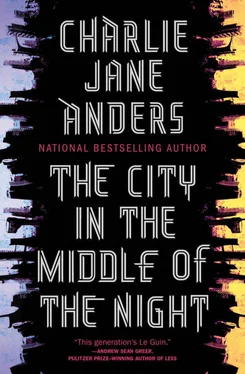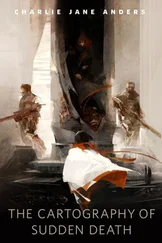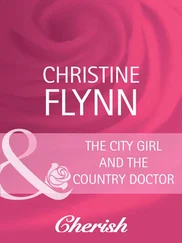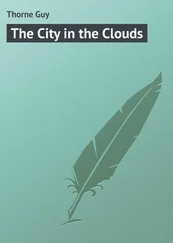Gelet had spent lifetimes cultivating this bloom. Mouth felt their terror and shock as it was stripped away, as the root system deep inside the vents began to wither and collapse. These plants laced throughout the world, collecting heat energy on the day side and redirecting it to the night, exhaling gases that calmed the skies. Over several visits, the Citizens ripped out every piece of nightfire they could find, until the sky changed. The clouds whirled until they ripped at the ice sheets and created brand-new mountains, as big as Mount Abacus, that moved through the night with the force of a million harpoon guns firing over and over.
A walking mountain of ice, with caustic liquid falling inside it—just like the downpour that had left burn scars on Mouth’s scalp and hands—came upon a Gelet nest full of untold thousands of newborns. The protective layers of rock and coral collapsed, turning to sharp fragments, and then the rain burned everything that had been exposed to the air. These fresh infants screamed as they suffocated and starved, no way to save them.
As they struggled to save their young, the Gelet saw the Citizens going back to harvest another batch of the nightfire.
Mouth knew what was coming next, and she tried to pull away from these tendrils. But the Gelet held her fast. The blue swarm, a last resort, something the Gelet had created long ago to deal with a species of pests coming in from the road. She felt their remorse as the blue knives took wing from a hatchery deep under the ice and flew to the nearest food source in the warm twilight.
Mouth was screaming and pushing the Gelet with her hands and feet. She begged for release. She bit her own tongue and kept barking. She wailed and thrashed. The emptiness inside her was worse than ten thousand bones burnt to ash. When they let go, she fell on her hands and face, watering the dirt and clawing at her own scars.
She threw up on the floor and her own knees, the remains of some meal supplements the Gelet had rescued from a human transport coming in ugly pieces. The puke in her mouth only reminded her of the noxious rainfall that had flooded the Gelet’s nest and destroyed their children.
“Please,” Mouth said over and over, as if she could petition some authority to take away the ugliness.
The Gelet waited until she had stopped writhing and making sounds, and then they reached out, lightly, as if she could still lash out or fall to pieces. They helped her to her feet and led her back to the chamber with the hammock, the old books, and the bags of freeze-dried survival rations from some doomed ancient expedition into the night.
You can go to the fifth central hub, downtown, and get these boiled chestnuts from a chef who gets them direct from the source, a chestnut patch buried under the thickest part of the night. Jean told me about it. The chestnuts melt against the roof of my mouth—so rich, after a diet of ancient human field rations. And once you’ve had enough chestnuts, you can go down the side chute and find yourself in a party where the “music” is made by an orchestra of countless tiny trumpets, which pressurize and depressurize the air around me in subtle fluctuations that human ears couldn’t even register. Here in the midnight city, there’s always a gathering, a celebration, someplace. I explore until my feet hurt, and I keep coming across another marvel. Like a school, where children, whose pincers look more like beaks, learn science and math from a teacher whose pincer encompasses all five of their tiny foreheads at once. (Their math begins with geometric shapes, and builds to patterns that remind me of the hangings on Ahmad’s walls.) And just up the street, there’s a theater where a dozen Gelet hang from stone ledges, and lean in to wrap all their pincers around a great tangle of flesh descending from the ceiling, which imparts a story to all of them at the same time. At another spot, a wide chamber with a low ceiling, the Gelet play a sport involving ice crystals and pressure-sensitive pads.
I navigate the city and almost don’t care when I walk in total darkness, except when I suddenly notice, and I heave with terror for a moment. I still get too scared to move from time to time, thinking of cops forcing me up a mountain, or a bloodbath under toxic rain, or being trapped in the Command Vehicle. But I’ve shared all of those memories with the Gelet, in as much detail as I could stand—and in the process I’ve learned to look at each terror, to peel it apart into tiny moments, and to place it alongside the countless generations of their memories that I’ve been absorbing. I’ve joined a family whose firsthand experience traces back to before humans even had a concept of history.
I haven’t seen what my new shape looks like, not with my eyes anyway, but my whole sense of my boundaries and my personal space has changed. I can “see” things happening far away, and “hear” the shape of the walls, thanks to my tentacles, which are smaller than a normal Gelet’s. I don’t always know exactly what I’m sensing, but it gets easier over time.
Nobody tries to stop me from roaming, now that I’m healed enough to move without feeling a million hacksaws tearing into me with every step. Everywhere I go, they’re curious, but polite. When someone does stop me to ask a question, it’s more along the lines of “How are you enjoying your stay?” or “Is there anything you need?” I’m the first foreigner among them in countless generations, maybe since the woman in that video, but they know me already.
When someone asks how I’m enjoying my stay, it comes not as words, but as a set of images and memory fragments that somehow evoke the concept of a solicitous host. When I reply, I babble. I share a memory of when I first arrived in Argelo, and I was scared to be in this crazy stormy city, and Ahmad taught me to make this fish bread that they all eat there. And I share another memory of Argelo, the first time I went to the Pit on my own, not to look for Bianca but because I craved those vapors. And how I felt, seeing people who celebrated having ancestors from Nagpur, for the first time. Then a flash of all the kindness I’ve received thus far, here in the midnight city.
This is way too much information, but they just send back an image of a perfect ice crystal: a kind of smile.
I keep trying to understand what the Gelet believe in. What religion, what politics? They give vague answers, like images of rock faces being worn away by the wind, or huge power generators turning somewhere underground. I wonder if one of these Gelet is Rose, my friend from the Old Mother, but they’ve all shared those memories among themselves, so everyone seems to feel as though they personally were up there with me. Gelet don’t have names, like humans, but each newborn Gelet is given a kind of blessing, or hope for their future. So Jean’s personal blessing was something like “good learner, future genius,” and the part of my brain that still uses language decided to shorten that to “Jean.” I’m not even sure how I tell each individual Gelet apart, but it’s some combination of scent, variations in size and shape, and some kind of “hum” that my new senses can perceive.
* * *
Exhaustion has a sudden reach for toppling me off my heels and bringing back the pain from my surgeries. I’ll explore, sticking my head into every archway—there are no doors here—and thrill at the discovery of a shop floor where Gelet are toiling in a circle over a set of gears that they shape according to a design they are sharing via touch. Or, in the next opening, a great bath where hot springs rise up and the Gelet cleanse their bodies. And then, just as I’m feeling the hunger to discover more, I’ll teeter and fall. The cold seeps back into my bones, and I remember I’m trapped underground, in total darkness, and my head spins.
Читать дальше












